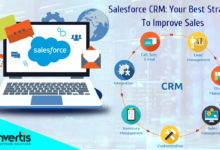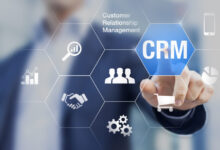Best CRM with Dialer: Find Your Perfect Match
Best CRM with dialer software isn’t just about making calls; it’s about streamlining your sales process, boosting agent productivity, and ultimately, driving revenue. Choosing the right system requires careful consideration of features, integrations, and your specific business needs. This guide dives deep into the world of CRM dialers, helping you navigate the options and find the perfect fit for your organization. We’ll explore various dialer types, crucial KPIs, top software options, and essential considerations for seamless integration, user experience, and data security.
From understanding the nuances of predictive, progressive, and power dialers to mastering call management and reporting, we’ll equip you with the knowledge to make an informed decision. We’ll also address common challenges and offer practical solutions, ensuring a smooth transition and maximum return on your investment.
Defining “Best CRM with Dialer”
Finding the “best” CRM with a dialer depends heavily on your specific business needs and sales processes. There’s no one-size-fits-all solution, but understanding the key components will help you make an informed decision. This involves considering the core CRM functionality, the type of dialer integrated, and the metrics used to measure its success.
Essential CRM System Features
A robust CRM system, regardless of dialer integration, should offer core features for managing customer interactions and data. These include contact management (organizing customer information), lead management (tracking potential customers), sales pipeline management (visualizing the sales process), reporting and analytics (measuring performance), and integration capabilities (connecting with other business tools). A good CRM provides a centralized hub for all customer-related data, improving team collaboration and streamlining workflows. Features like automation (for tasks like email marketing or follow-ups) and customizability (to adapt to specific business needs) are also valuable additions.
Dialer Types Integrated with CRMs
Several dialer types integrate with CRMs, each offering distinct advantages and disadvantages.
- Predictive Dialers: These automatically dial the next number in a queue, connecting the agent only when a live person answers. They significantly increase call volume, but can also lead to a higher rate of unanswered calls and potentially frustrated agents if not managed properly. Example: A large telemarketing firm using a predictive dialer to reach potential customers for a new product launch.
- Progressive Dialers: These dial the next number only after the agent finishes the previous call. This offers a more controlled approach, reducing the likelihood of unanswered calls and allowing for more focused conversations. Example: A smaller sales team making follow-up calls to qualified leads.
- Power Dialers: A blend of predictive and progressive dialing, offering more control than a purely predictive system while still boosting call volume compared to a purely progressive system. Example: A mid-sized business using a power dialer to manage outbound sales calls and appointment scheduling.
- Auto Dialers: These dial numbers automatically, but unlike predictive dialers, they do not typically filter out busy signals or answering machines. This is often a simpler and less sophisticated solution than predictive or power dialers. Example: A non-profit organization using an auto-dialer for fundraising outreach.
Key Performance Indicators (KPIs) for CRM Dialer Effectiveness
Measuring the effectiveness of a CRM dialer requires tracking key performance indicators. These include:
- Call Connect Rate: The percentage of calls that successfully connect with a live person.
- Average Handle Time (AHT): The average duration of a call, including hold time, talk time, and after-call work.
- Conversion Rate: The percentage of calls that result in a desired outcome, such as a sale or appointment.
- Call Abandonment Rate: The percentage of calls where the customer hangs up before connecting with an agent.
- Agent Productivity: The number of calls made or leads contacted per agent per hour or day.
Comparison of Common CRM Dialer Features
| Feature | Description | Pros | Cons |
|---|---|---|---|
| Predictive Dialing | Automatically dials numbers, connecting only when answered. | High call volume, increased efficiency. | High abandonment rate, potential for agent burnout. |
| Progressive Dialing | Dials the next number after the agent finishes the previous call. | Controlled pace, higher quality interactions. | Lower call volume compared to predictive dialing. |
| Power Dialing | Combines aspects of predictive and progressive dialing. | Balances call volume and agent control. | Requires careful configuration to avoid negative impacts. |
| Call Recording | Records calls for quality assurance and training. | Improves agent performance, identifies areas for improvement. | Requires storage space and adherence to privacy regulations. |
| CRM Integration | Seamlessly integrates with CRM software. | Centralized data, improved workflow. | Requires compatible CRM and dialer systems. |
Security and Compliance
Choosing a CRM with a dialer involves serious consideration of data security and regulatory compliance. Protecting sensitive customer information is paramount, and failing to do so can lead to significant legal and financial repercussions. This section outlines the crucial security measures and compliance requirements you should expect from a reputable CRM dialer provider.
Protecting customer data within a CRM dialer requires a multi-layered approach. This isn’t just about preventing breaches; it’s about maintaining trust and adhering to legal obligations. Effective security isn’t a one-time fix; it’s an ongoing process of adaptation and improvement in response to evolving threats.
Data Encryption and Access Control
Data encryption, both in transit and at rest, is fundamental. This means all customer data should be encrypted using strong encryption algorithms to prevent unauthorized access even if a breach occurs. Furthermore, robust access control mechanisms, such as role-based access control (RBAC), are crucial. RBAC ensures that only authorized personnel have access to specific data, limiting the potential impact of any security compromise. For instance, a sales representative might only have access to their assigned leads’ data, while administrators have broader access for system management. This granular control minimizes risk.
Compliance with GDPR, CCPA, and Other Regulations
Compliance with regulations like the General Data Protection Regulation (GDPR) in Europe and the California Consumer Privacy Act (CCPA) in the US is non-negotiable. These regulations dictate how personal data must be handled, stored, and protected. A CRM dialer must demonstrate compliance through data processing agreements, robust data security measures, and mechanisms for data subject requests (e.g., the right to be forgotten). Failure to comply can result in substantial fines and reputational damage. For example, a company failing to comply with GDPR could face fines up to €20 million or 4% of annual global turnover.
Best Practices for Data Security and Privacy
A proactive approach to security is essential. Regular security audits and penetration testing should be conducted to identify vulnerabilities before malicious actors can exploit them. Employee training on data security best practices is also critical, as human error is a major cause of security breaches. Implementing multi-factor authentication (MFA) adds an extra layer of security, making it significantly harder for unauthorized individuals to access the system. Finally, maintaining up-to-date software and security patches is crucial to protect against known vulnerabilities.
Security Best Practices for CRM Dialers
Implementing these security measures will significantly improve your data protection posture:
- Regular security audits and penetration testing.
- Strong password policies and multi-factor authentication (MFA).
- Data encryption both in transit and at rest (using strong encryption algorithms).
- Role-based access control (RBAC) to limit data access.
- Regular software updates and security patches.
- Employee training on data security best practices and awareness of phishing attempts.
- Data loss prevention (DLP) measures to prevent sensitive data from leaving the system unauthorized.
- Incident response plan to handle security breaches effectively.
- Compliance with relevant data privacy regulations (GDPR, CCPA, etc.).
- Regular backups of data to ensure business continuity in case of data loss.
Scalability and Customization
Choosing a CRM with a dialer isn’t just about finding a system that works today; it’s about finding one that will grow with your business. A truly effective solution needs to seamlessly adapt to increasing call volumes, expanding sales teams, and evolving business processes. This means looking beyond immediate needs and focusing on the long-term scalability and customization options offered by the system.
A CRM dialer should be more than just a static tool; it should be a flexible platform that can be molded to fit your unique workflows. Customization allows you to optimize your system for maximum efficiency, ensuring that your team spends less time navigating software and more time connecting with customers. The right level of customization can significantly impact your bottom line, streamlining operations and boosting productivity.
Customization Improves Efficiency
Tailoring your CRM dialer to your specific business processes leads to substantial efficiency gains. For example, imagine a real estate agency. A customized system could automatically populate lead information from online forms directly into the CRM, eliminating manual data entry. Furthermore, custom workflows could trigger automated email sequences based on lead interactions, nurturing prospects without requiring agent intervention. This automated approach frees up agents to focus on higher-value tasks like closing deals. Another example is a customer service team that uses a CRM dialer with customized call routing based on customer segment or issue urgency. This ensures that calls are directed to the most appropriate agent, leading to faster resolution times and improved customer satisfaction. In both cases, customization translates directly into time saved and improved performance.
Beneficial Customization Features
Several customization features significantly enhance user experience and productivity.
- Customizable Dashboards: Dashboards should allow users to personalize their views, showcasing the key metrics and information most relevant to their roles. For example, a sales manager might prioritize conversion rates and deal pipeline, while a customer service representative might focus on call resolution times and customer satisfaction scores.
- Workflow Automation: Automating repetitive tasks, such as lead assignment, follow-up emails, and call scheduling, frees up valuable time. This automation can be customized to match specific business rules and processes.
- Customizable Reporting and Analytics: The ability to generate custom reports tailored to specific needs is crucial. This allows businesses to track key performance indicators (KPIs) and identify areas for improvement. For instance, a company might create a custom report analyzing call duration by agent to identify training opportunities.
- Integration with Other Systems: Seamless integration with existing software, such as marketing automation platforms and email marketing tools, is vital for a cohesive system. This prevents data silos and enhances overall efficiency. For example, integrating the dialer with a marketing automation platform allows for triggered calls based on specific customer actions, like website visits or email opens.
- Customizable Fields and Objects: The ability to add custom fields and objects allows for the storage and tracking of specific data points relevant to the business. This could include anything from customer preferences to product-specific information.
Last Word
Selecting the best CRM with a dialer is a pivotal decision for any sales-driven business. By understanding the key features, evaluating different software options, and prioritizing seamless integration and user experience, you can significantly enhance your sales team’s efficiency and achieve your business objectives. Remember to consider your specific needs, scale your choice appropriately, and always prioritize data security. With the right CRM dialer, you’re not just making calls; you’re building relationships and driving growth.

